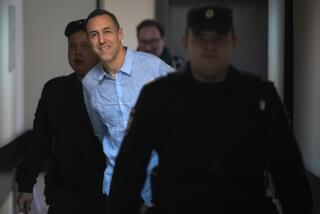Russia Scientist Loses Court Appeal
- Share via
MOSCOW — In what was widely seen as an attempt to crack down on researchers and academics, the Russian Supreme Court on Tuesday upheld a 15-year prison term for a nuclear scientist convicted of passing military secrets to foreigners.
The high court’s ruling ended the respected researcher’s domestic appeals and appeared to guarantee that Igor V. Sutyagin, whose case has attracted the attention of scientists and human rights groups around the world, will be sent to a prison labor camp.
Sutyagin is one of several Russians recently accused of espionage in what critics say is an attempt by hard-liners in the government to assert greater control over academics, writers, environmentalists and journalists.
In June, the Supreme Court reinstated an espionage case against Siberian physicist Valentin Danilov, who six months earlier had been acquitted of charges that he sold secret satellite technology to a company in China.
Danilov insisted that it was elementary and well-known information he provided as part of a joint research project on weather in space, which he contracted to perform as a way of continuing his own research after his government funding dried up.
“This whole thing has resembled very strongly the 1930s and the purges,” Danilov said in an interview before his rearrest in June. “This is a well-oiled machine. Stupidity would be too easy a way to explain it.”
Lawyers said Sutyagin’s trial was unfair, noting that the court switched juries to include citizens with purported connections to the security services, barred much of the cross-examination and issued instructions that made it difficult for jurors to acquit the scientist. During Sutyagin’s appeal hearing this week, the attorneys said, judges switched off the sound when he tried to defend himself by video link from jail.
“What happened is proof that the judicial system in the Russian federation is functionally not working,” said Ernst Cherniy of the Public Committee for Protection of Scientists, which submitted letters of protest on Sutyagin’s case from scientists in the U.S., Canada and Europe, including three Nobel laureates. “This kind of thing cannot happen in a normal judicial system.”
Sutyagin, who has been in custody since his arrest in October 1999, was an arms control researcher with the Moscow-based USA-Canada Institute, a think tank.
The 39-year-old father of two teenage daughters had a legal freelance contract with a British consulting firm, Alternative Futures, to provide research materials on Russian weapons systems and other military issues. Prosecutors alleged that the company was a front for the CIA, and identified Sutyagin’s two contacts at the firm as U.S. intelligence agents.
The prosecution called witnesses from a naval academy at which Sutyagin lectured who testified that the scientist asked a lot of questions about a submarine project. “They said Sutyagin asked too many questions. He was too curious,” said the scientist’s lawyer, Anna Stavitskaya.
But she said the same witnesses testified in the closed-door trial that Sutyagin never asked about the alleged secrets he is accused of passing. Sutyagin argued that the information he provided was in the public domain, some of it published in a book on Russia’s strategic nuclear forces that is available in English all over the world.
Defense lawyers said the European Court of Human Rights had agreed to take the case on a priority basis, which could lead to a hearing as early as the end of the year and reverse the conviction if it found violations of certain legal conventions.
“The Supreme Court decision today clearly emphasized the change of the political climate in this country,” said Grigory Pasko, a journalist and former naval captain who spent three years in prison on widely questioned espionage charges. “It is clear that the Supreme Court didn’t confirm a decision of the lower court. It simply obeyed a decision of the Kremlin or the FSB [Federal Security Service], which are currently the same thing.”
The scientist’s wife, Irina, sobbed quietly during a telephone interview after the ruling.
“I lost all hope. My life is shattered.... I have lost all certainty about everything in this country,” she said. “I know for sure only one thing: My husband is innocent. And I don’t know why my country needs to victimize a young, talented scientist to prove that spies can still be found among us.”
Times staff writer Sergei L. Loiko contributed to this report.
More to Read
Sign up for Essential California
The most important California stories and recommendations in your inbox every morning.
You may occasionally receive promotional content from the Los Angeles Times.










